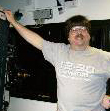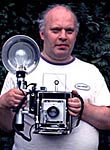|
|
This topic comprises 4 pages: 1 2 3 4
|
|
Author
|
Topic: The end of the reel -- Examining the digitalization of film
|
Jeffry L. Johnson
Jedi Master Film Handler

Posts: 809
From: Cleveland, Ohio, USA
Registered: Apr 2000
|
 posted 04-11-2008 10:45 AM
posted 04-11-2008 10:45 AM





Gauntlet Features web page quote:
Gauntlet Features - The end of the reel
Examining the digitalization of film
Story by: Ryan Pike, Entertainment Editor and Jordyn Marcellus, E&P Editor
Story date: Thursday, March 27, 2008
Film is the magic medium. It's an art form limited only by the creator's imagination. It's a fusion of painting, photography, theatre, music and writing. Film can bring delight to children and melancholy to adults. Ever since the earliest Lumiere films scared audiences with the first moving images of a train looming into the screen, the idea of making films for a living has been the premiere aspiration for millions of starry-eyed creative types the world over.
With our culture's digitalization, film has been rapidly upgrading and becoming more and more based on the computer. From Tron's primitive graphics, to the fully computer-generated Jar Jar Binks in the Star Wars prequel trilogy, there has been tremendous growth in the way film is made over 20 years. Through that time, there's been a single constant: when the movie ships to theatres for projection, it's printed on 35mm film.
"Thirty-five millimetre has been the commercial industry standard since 1914," says University of Calgary associate professor of film studies Charles Tepperman. "What that means is that, if you want to watch something, you need to watch it on 35mm. You don't expect that a format like that will be stable forever-most people tend to agree that digital projection and filmmaking will eventually replace 35mm."
The changing of the guard has begun in Calgary as multiplexes like the Sunridge Spectrum and Scotiabank Chinook are gearing up for the wave of the future: digital projection. Digital projection is the logical continuation of the movement to digital video and high definition video formats. With the Big Mouse in Hollywood handling the big push for digital projection, it's no surprise that it is being brought from the cutting edge to the mainstream.
"Disney-in their infinite wisdom-released Hannah Montana 3D and it was a monstrous success reaching $30 million on opening weekend with just a handful of screens," explains Leonard Binning, president of the Motion Picture Theatre Association of Alberta. "Unfortunately, it did not play anywhere where there was not 3D [digital projection], so they really pushed and forced for it. It's not that every one of Cineplex's theatres are making every one of their screens digital. [Cineplex is] moving to it, as is the industry."
Although Disney is fiercely lobbying for the movement to digital projection for the implementation of 3D filmmaking, it won't be a sudden changeover to the new format, according to Binning.
"Honestly, we're probably three-to-five years away from total conversion," says Binning. "It's a huge, huge undertaking, but if we want to talk about quality, it's fantastic. Especially the three-dimensional stuff-that could redefine how people go to the movies again."
Binning argues that the one fundamental problem of modern cinema houses-the unprepared 15-year-old projectionist-can cause previously gorgeous film prints to become muddled, scratched-up messes after its second showing. Digital projection's greatest strength, then, is a crystal-clear image quality every time, regardless of who's in the booth.
"The upside to digital projection is perfect presentation every time," explains Binning.
"Whether you see No Country for Old Men on opening night or six months later, it's going to be crystal clear, as good-possibly better-than 35mm. Right now there are detractors that say digital's not as good. That was largely true until about a year ago. Digital is now every bit as good and, if you move into the 4k system, it's probably better than 35mm."
If people believe 3D filmmaking and consistently perfect image quality would help change the viewing experience entirely, as Binning argues, there's still one issue: what about theatres whose finances wouldn't allow them to show a film in 3D? Places like the Uptown and the Plaza in Calgary, which are independently owned and operated, may not be able to compete with the juggernaut theatres whose finances allow them to recoup the expensive costs of converting to digital.
"You could probably outfit a traditional projector booth for $50,000�$60,000 if you're a good shopper," says Binning. "[For digital projection] you're looking at probably a minimum of $100,000 per booth-and that's if you aren't replacing the [cinema's] screen. The cost is almost double. Costs are much higher, not just the up-front cost, but the maintenance. The replacement bulbs for the projectors are rumoured to be about double. Upkeep is rumoured to be almost double. If you were spending a couple thousand a year in [general] maintenance, that's probably going to be $4,000�$5,000 a year."
These higher costs will help to drain the already-shallow coffers of small or independent theatres. NUTV executive director Michelle Wong drives the point home by discussing a classic Calgary arthouse cinema: Kensington's Plaza Theatre.
"Looking at the Plaza, for them to upgrade to digital equipment that's going to take a huge pipeline of information off an FTP site and then projecting it, that's where the real challenge is going to be," notes Wong. "Where are they going to get the money to improve their equipment to basically broadcast productions?"
While people may not necessarily spend their time thinking about theatres like the Plaza, Tepperman shares an interesting anecdote that relates back to our own university-with troubling implications for theatres.
"Here on campus, we had to mothball the old 35mm projectors last summer because they were too expensive to maintain," says Tepperman. "[But], places like the Plaza have a commitment to showing old 35mm film and old films that are on the classic stock."
For years, Canadian filmmakers have struggled to get their films played in the big multiplex theatres. With digital projection, Wong suggests that the movement to digital will not only hurt the smaller theatres, but also the independent filmmakers whose movies are shown there.
"Where is Canadian cinema shown but in independent Canadian cinemas?" asks Wong. "The impact is more in exhibition down the line than in production. I don't know whether independent filmmakers will feel the negative impact as much as exhibitors would. If they can't do the upgrade and if their productions can't compete quality-wise with mainstream cinema, then maybe they won't have as many audiences as mainstream theatres."
Digital filmmaking also creates a huge disparity between what theatres can play. All-digital theatres may have an additional problem presenting classic films in their original format.
"One of the things that film exhibition as a standardized practice has insured is that even if an independent film isn't being distributed through mainstream avenues it would still be on the right format to be shown in a theatre," says Tepperman. "Could old films like Lawrence of Arabia still be shown in [all-digital] theatres, even though you can only get film prints of it?"
As well, increased maintenance costs will likely further inflate ticket prices. From the days of $5 matinees, to the age of $12 tickets, theatres are charging audiences an arm and a leg for the opportunity to see a flick. If it costs so much more for theatres to switch to this new format, what does that mean for the average consumer?
"Costs go up and I'm hoping that we don't pass all of that on to the moviegoer," Binning says. "What I'm hoping we'll see is perhaps-through the offering of a greater variety of product, the knowledge that the presentation is always going to be perfect, the 3D and novelty factor-attendance will start to increase again. Attendance at movie theatres has been fairly flat and maybe even slightly declining for a number of reasons. I think this is looked to as saviour in putting more bums in the seats."
Despite all the economics, filmmaking is at its core an art. When it comes to filmmakers' aesthetic choices, there's always a worry about the way the film looks. As a visual medium, light and colour are vital components to film. DV and HD video filmmaking technologies-the precursor to digital projection, which have been around for years-have specific disadvantages, explains Alberta Media Arts Alliance Society vice president Melody Jacobson.
"There are qualities that you'll see when you're watching film that get flattened out when you see them digitally," says Jacobson. "That's why watching films on film[stock] is so special. The quality of the light and the depth of the image on film is different than on digital-for example, colours will often look more natural on film."
Wong further elaborates on the technical aspects of Jacobson's argument.
"We're taking about range and latitude of colour," she explains. "When you take a picture with film stock, you're going to get a high-resolution picture with black-blacks and white-whites. In regard to colour, you're going to get a broad latitude, but with digital video, the latitude may be half as much."
While digital has its advantages, Jacobson notes that film has a much closer biological analogue than digital video formats.
"Film is more natural to the way that we see and our eyes," says Jacobson. "Digital [video] oftentimes makes what the audience is watching look hyper-realistic. Our brains process images like film and that makes it easier to get pulled into the story and screen than when it's a digitally shot film. With digital, it always feels like there's something between, you, the viewer, and the image on screen."
Beyond the natural look of film, digital reproductions actually contain less information than their film original and shooting digital originally to avoid conversion is an expensive option, Wong adds.
"Converting the film into HD or a digital file, it only contains a portion of that information in the filmstrip," she explains. "When you're shooting in digital and they're talking about 1080i-which is the upper realm of its resolution-to function in a total HD realm is quite expensive because you're talking about terabytes of data as opposed to the ease of buying 400 feet of 16mm or 1000 feet of 35mm."
At the end of the day, audiences will determine if digital projection supplants the old stalwart of 35mm or is relegated to novelty pictures like the old Smell-o-Vision films of the 1950s.
"There are some test markets in the [U.S.] where there are two competing theatres across the street from each other in the same market where one has digital and one doesn't have digital," says Binning. "Three-to-six months, there's a blip in attendance. Thereafter, the dust settles and the numbers settle out again. It's not like people go, 'wow, I'm going to digital, it saved the world.' At the end of the day, Hollywood still has to put out a good product. Even if it looks good on the screen, if it's crap, people are not going."
-end of story-
-image follows-
| IP: Logged
|
|
|
|
|
|
Darryl Spicer
Film God

Posts: 3250
From: Lexington, KY, USA
Registered: Dec 2000
|
 posted 04-11-2008 01:50 PM
posted 04-11-2008 01:50 PM



quote:
"Disney-in their infinite wisdom-released Hannah Montana 3D and it was a monstrous success reaching $30 million on opening weekend with just a handful of screens,"
They always get me with this one. Granted it did a lot of business in that first week but dropped like a turkey in the remaining weeks. At $15 dollars a pop.
quote:
"You could probably outfit a traditional projector booth for $50,000�$60,000 if you're a good shopper," says Binning. "[For digital projection] you're looking at probably a minimum of $100,000 per booth-and that's if you aren't replacing the [cinema's] screen. The cost is almost double. Costs are much higher, not just the up-front cost, but the maintenance. The replacement bulbs for the projectors are rumoured to be about double. Upkeep is rumoured to be almost double. If you were spending a couple thousand a year in [general] maintenance, that's probably going to be $4,000�$5,000 a year."
When he says per booth does he mean per screen or the entire booth? If the latter where does he get his figures.
| IP: Logged
|
|
|
|
|
|
|
|
|
|
|
|
|
|
|
|
|
|
|
|
|
|
|
|
|
|
All times are Central (GMT -6:00)
|
This topic comprises 4 pages: 1 2 3 4
|
Powered by Infopop Corporation
UBB.classicTM
6.3.1.2
The Film-Tech Forums are designed for various members related to the cinema industry to express their opinions, viewpoints and testimonials on various products, services and events based upon speculation, personal knowledge and factual information through use, therefore all views represented here allow no liability upon the publishers of this web site and the owners of said views assume no liability for any ill will resulting from these postings. The posts made here are for educational as well as entertainment purposes and as such anyone viewing this portion of the website must accept these views as statements of the author of that opinion
and agrees to release the authors from any and all liability.
|

 Home
Home
 Products
Products
 Store
Store
 Forum
Forum
 Warehouse
Warehouse
 Contact Us
Contact Us




 Printer-friendly view of this topic
Printer-friendly view of this topic













![[Wink]](wink.gif) )
)




